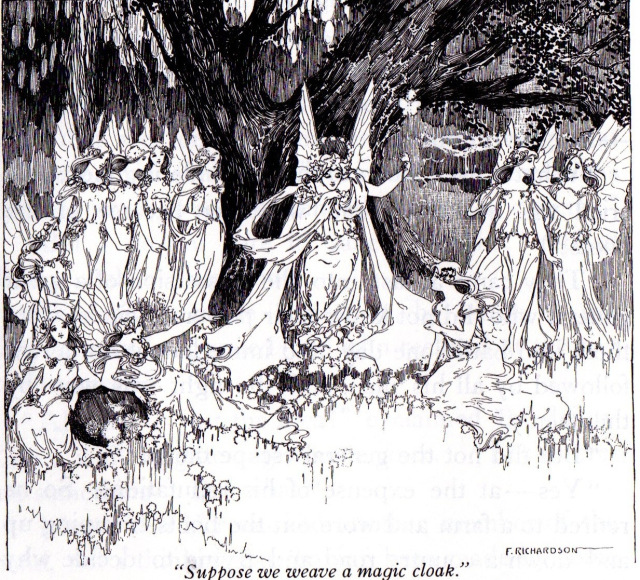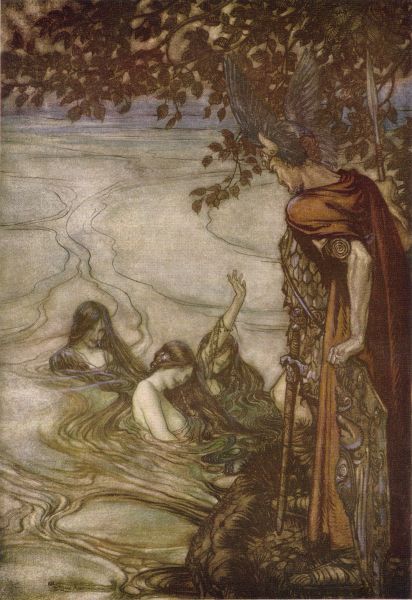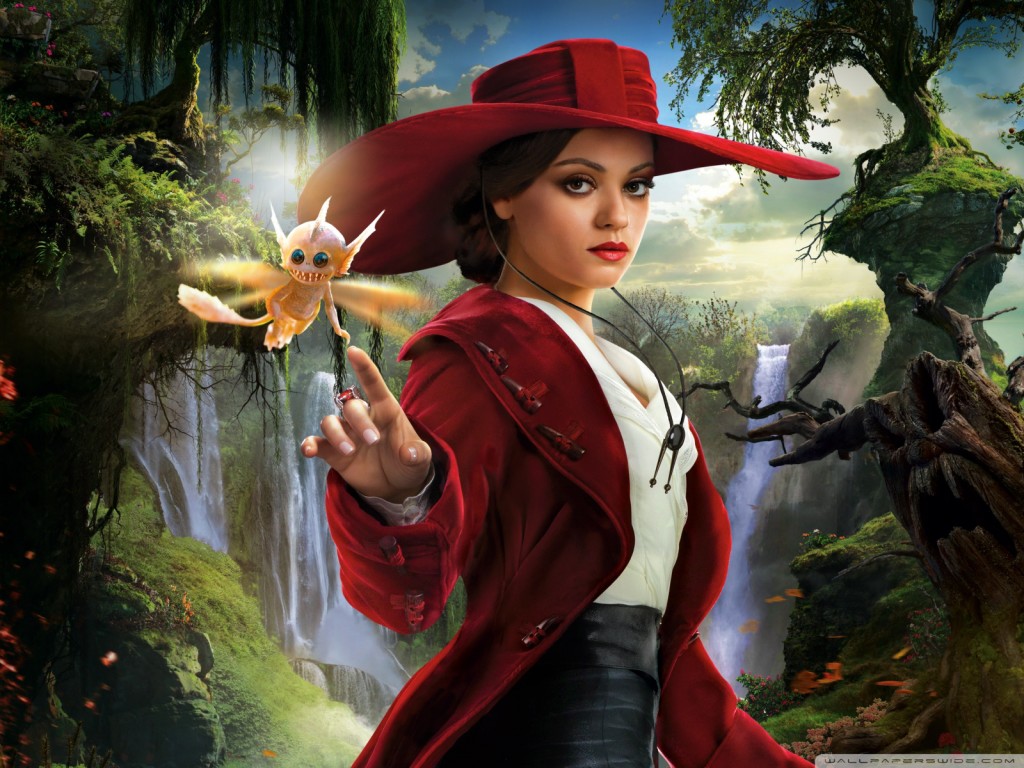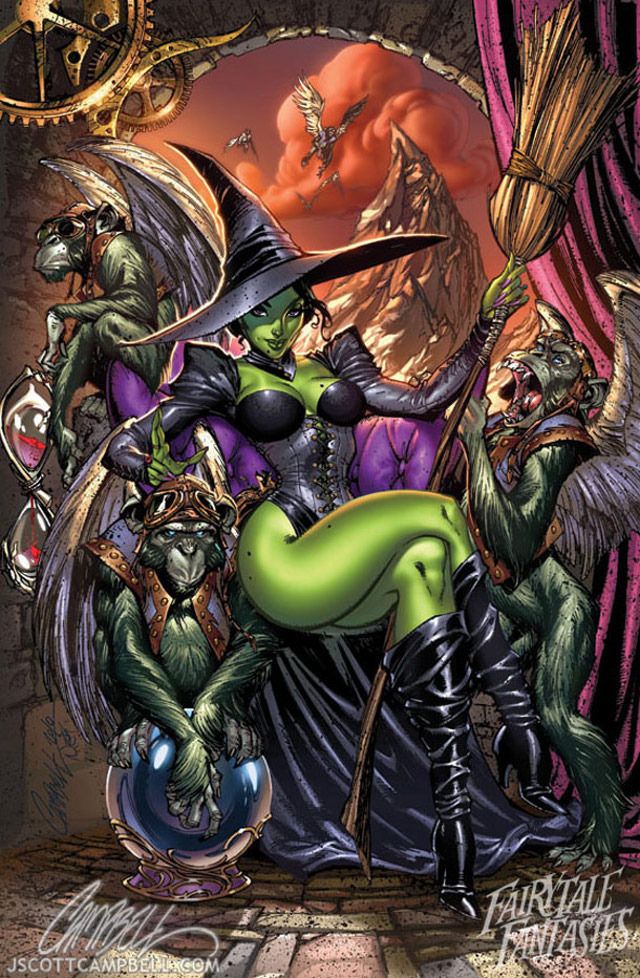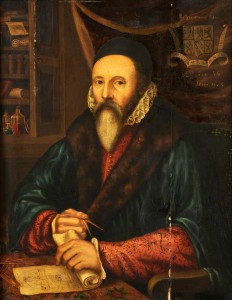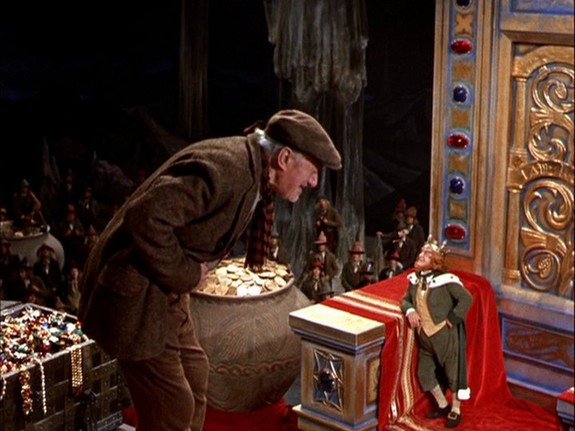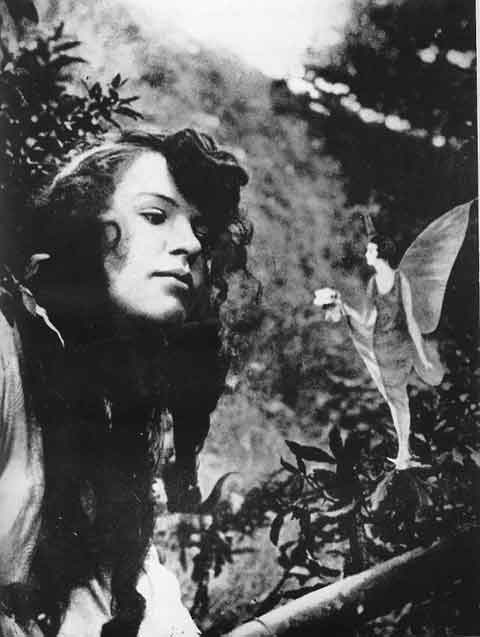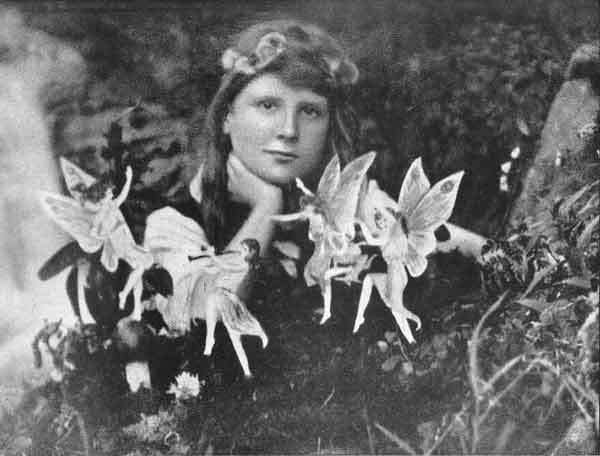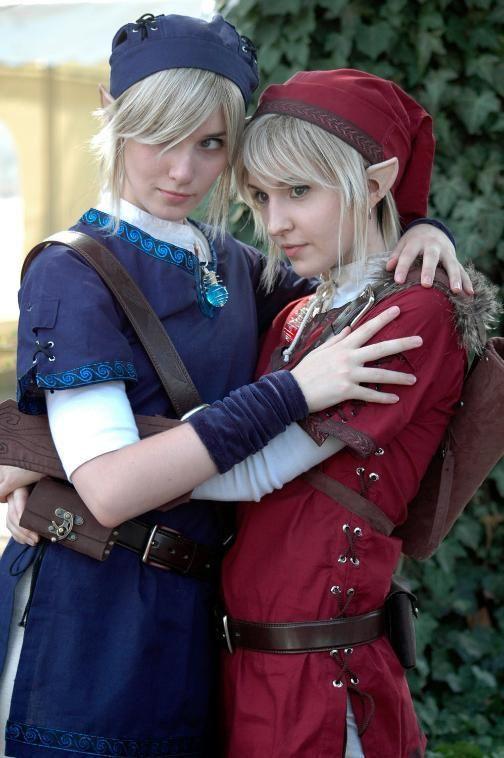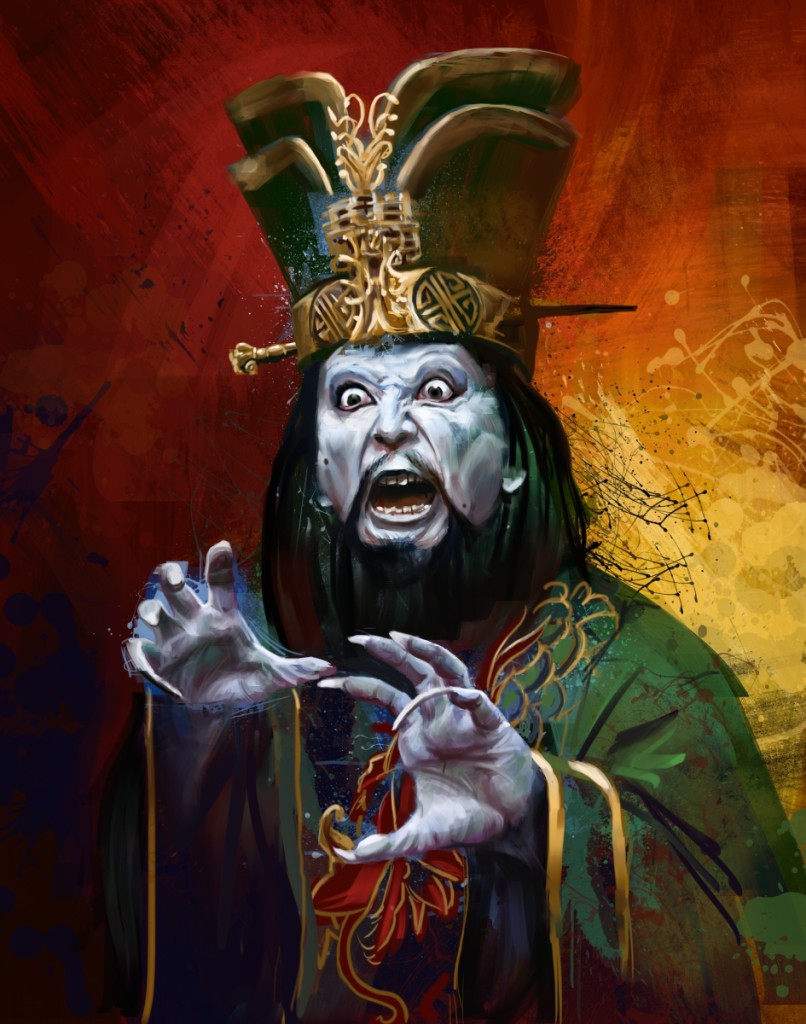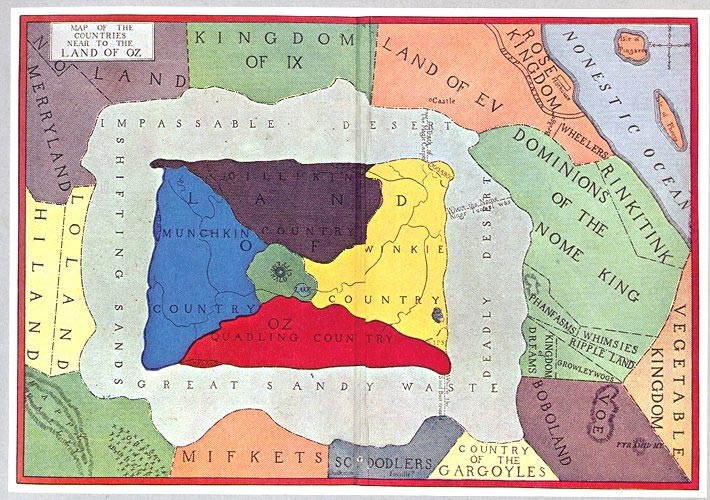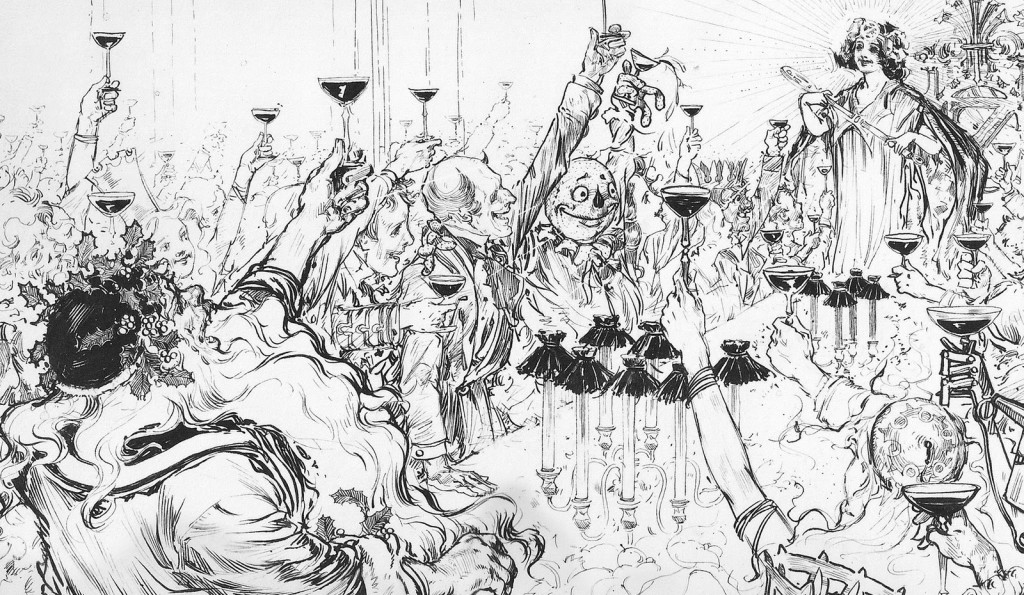Why DID the Wicked Witch Melt?
It has long been assumed that the reason why the Wicked Witch of the West melted when splashed by a bucket of water was due to the particular nature of the Witch. It is that conclusion I wish now to dispute.
Here is the crucial passage, as reported by the Royal Historian of Oz, L Frank Baum, whose veracity and authenticity has been so thoroughly confirmed by many other scientific investigators of the Land of Imagination and its queer inhabitants as to make any doubt not merely inconceivable but inexplicable:
The girl had to work hard during the day, and often the Witch threatened to beat her with the same old umbrella she always carried in her hand. But, in truth, she did not dare to strike Dorothy, because of the mark upon her forehead. The child did not know this, and was full of fear for herself and Toto. Once the Witch struck Toto a blow with her umbrella and the brave little dog flew at her and bit her leg in return. The Witch did not bleed where she was bitten, for she was so wicked that the blood in her had dried up many years before.
…
Now the Wicked Witch had a great longing to have for her own the Silver Shoes which the girl always wore. Her bees and her crows and her wolves were lying in heaps and drying up, and she had used up all the power of the Golden Cap; but if she could only get hold of the Silver Shoes, they would give her more power than all the other things she had lost. She watched Dorothy carefully, to see if she ever took off her shoes, thinking she might steal them. But the child was so proud of her pretty shoes that she never took them off except at night and when she took her bath. The Witch was too much afraid of the dark to dare go in Dorothy’s room at night to take the shoes, and her dread of water was greater than her fear of the dark, so she never came near when Dorothy was bathing. Indeed, the old Witch never touched water, nor ever let water touch her in any way.
But the wicked creature was very cunning, and she finally thought of a trick that would give her what she wanted. She placed a bar of iron in the middle of the kitchen floor, and then by her magic arts made the iron invisible to human eyes. So that when Dorothy walked across the floor she stumbled over the bar, not being able to see it, and fell at full length. She was not much hurt, but in her fall one of the Silver Shoes came off; and before she could reach it, the Witch had snatched it away and put it on her own skinny foot.
The wicked woman was greatly pleased with the success of her trick, for as long as she had one of the shoes she owned half the power of their charm, and Dorothy could not use it against her, even had she known how to do so.
The little girl, seeing she had lost one of her pretty shoes, grew angry, and said to the Witch, “Give me back my shoe!”
“I will not,” retorted the Witch, “for it is now my shoe, and not yours.”
“You are a wicked creature!” cried Dorothy. “You have no right to take my shoe from me.”
“I shall keep it, just the same,” said the Witch, laughing at her, “and someday I shall get the other one from you, too.”
This made Dorothy so very angry that she picked up the bucket of water that stood near and dashed it over the Witch, wetting her from head to foot.
Instantly the wicked woman gave a loud cry of fear, and then, as Dorothy looked at her in wonder, the Witch began to shrink and fall away.
“See what you have done!” she screamed. “In a minute I shall melt away.”
“I’m very sorry, indeed,” said Dorothy, who was truly frightened to see the Witch actually melting away like brown sugar before her very eyes.
“Didn’t you know water would be the end of me?” asked the Witch, in a wailing, despairing voice.
“Of course not,” answered Dorothy. “How should I?”
“Well, in a few minutes I shall be all melted, and you will have the castle to yourself. I have been wicked in my day, but I never thought a little girl like you would ever be able to melt me and end my wicked deeds. Look out–here I go!”
With these words the Witch fell down in a brown, melted, shapeless mass and began to spread over the clean boards of the kitchen floor. Seeing that she had really melted away to nothing, Dorothy drew another bucket of water and threw it over the mess. She then swept it all out the door. After picking out the silver shoe, which was all that was left of the old woman, she cleaned and dried it with a cloth, and put it on her foot again. Then, being at last free to do as she chose, she ran out to the courtyard to tell the Lion that the Wicked Witch of the West had come to an end…
The most common theory of Nonesticologists and Ozophiles is that, as commonly happens to practitioners of the Dark Art, the pure wickedness of the Wicked Witch made her blood curdle, and then dry up. Being in the enchanted land of Oz, death did not result.
This no doubt is because the whole nation is under the blessing of the Fairy Queen Lurline (known in civilized lands as Lorelei the Rhinemaiden) whose band for reasons or whimsy unknown to mortals, alighting in Oz, banished aging, dying and death forever, and established the legendary king, Pastoria, as monarch.
Hence, the most common theory is that the water, striking the dry and dessicated flesh of the Witch, by the ordinary action of water acting as a solvent, dissolved the flesh. Technically, each particle of the Witch is still alive, as per Lurline’s blessing, and still exists in the stain swept out the door by Dorothy.
Purist should note what the Wicked Witch of the West, according to canonical sources confirmed by Ozocologists and Oziatrists of eminent reputation, was a hag dressed in yellow and sporting an eyepatch, but that her remaining eye was more powerful than a telescope. She is not green.
So she looks like this:
And certainly not like this:
The same sources report that the shoes were silver, not ruby, as has been often repeated. These slivers are powerful magical talismans, first used by Perseus, lost in mid air by Dorothy Gale, and later recovered by the disastrous Pabodie Expedition to Antarctica in 1930–31. Presently used by Bureau Thirteen of the US Paranormal Research and Defense Administration.
Researchers suspect that it is the presence of the apocryphal green-skinned Witch of popular legend that so long obscured the darker and more morbid truth about her career and demise.
Experiments carried out by Lysenko in Russia, and our own Charles Dexter Ward here in America have demonstrated that, upon the dessication of the blood to the point where dogbites do not bleed, in nine cases out of twelve, a condition of Heisenberg uncertainty known as psychopompic amorbidity, called by the vulgar, ‘being undead’ must result.
The disastrous results of the research, no doubt attempted without proper scientific controls, that eventuated in incident of Raccoon City, Ohio, while involving some unavoidable loss of life, did provide firm evidence, useful to the march of science, that no entity lacking in blood, with the obvious exception of the Mi-Go, can properly be called alive. The Umbrella Corporation has disavowed all responsibility for the alleged incident, and the Administration has confirmed that the break-out event was the result of a few rogue agents in the Cincinnati office.
Based on this, top Ozological researchers have concluded that the one-eyed Witch, perhaps even unknown to herself, when her blood dried, was technically undead, just as a vampire, and while we owe all due respect to Lurline, it is rumored that she is the full sister of King Brian of Knocknasheega, who, as has been demonstrated by the eminent fairy researcher Dr Vandermast of Acrozayana (I mean eminent fairies who do research, not humans who research eminent fairies), is indeed an exile from heaven, while perhaps not being a fallen angel per se.
The essential passage is found here, found in the excellent and truthful history DARBY O’ GILL AND THE GOOD PEOPLE, which, despite the length, I must give in full:
Looking down, Father Cassidy saw a little cloaked figure, and caught the glint of a goold crown. ‘Twas Brian Connors, the king of the fairies, himself, that was in it.
His words had so friendly a ring in them that the clargyman smiled in answering, “Why, thin, good fortune to you, King Brian Connors,” says the good man, “an’ save you kindly. What wind brought you here?” he says.
The king spoke back free an’ pleasant. … The priest came so near saying “God bless ye,” that the king’s hair riz on his head. But Father Cassidy stopped in the nick of time, changed his coorse, an’ steered as near a blessing as he could without hurting the Master of the Good People.
“Well, may you never hear of throuble,” he says, “till you’re wanted to its wake,” says he. “There’s no throuble to-night at any rate,” says the king, “for while Shaun is fixing the baste we’ll sit in the shelter of that rock yonder; there we’ll light our pipes and divart our minds with pleasant discoorsin’ and wise convarsaytion.”
While the king spoke, two green-cloaked little men were making a fire for the smith out of twigs. So quick did they work, that by the time the priest and the fairy man could walk over to the stone and sit themselves in the shelther, a thousand goold sparks were dancin’ in the wind, and the glimmer of a foine blaze fought with the darkness.
Almost as soon, clear and purty, rang the cheerful sound of an anvil, and through the swaying shadows a dozen busy little figures were working about the horse. Some wore leather aprons and hilt up the horse’s hoof whilst Shaun fitted the red hot shoe; others blew the bellows or piled fresh sticks on the fire; all joking, laughing, singing, or thrickin’; one couldn’t tell whether ’twas playing or workin’ they were.
Afther lighting their pipes and paying aich other an armful of complayments, the Master of Sleive-na-mon and the clargyman began a sayrious discoorse about the deloights of fox hunting, which led to the considheration of the wondherful wisdom of racing horses and the disgraceful day-ter-ray-roar-ation of the Skibberbeg hounds.
Father Cassidy related how whin Ned Blaze’s steeplechasin’ horse had been entered for the Connemarra Cup, an’ found out at the last minute that Ned feared to lay a bet on him, the horse felt himself so stabbed to the heart with shame by his master’s disthrust, that he trew his jockey, jumped the wall, an’, head in the air, galloped home.
The king then tould how at a great hunting meet, whin three magisthrates an’ two head excises officers were in the chase, that thief of the worruld, Let-Erin-Raymimber, the chief hound of the Skibberbeg pack, instead of follying the fox, led the whole hunt up over the mountain to Patrick McCaffrey’s private still. The entire counthryside were dhry for a fortnit afther.
Their talk in that way dhrifted from one pleasant subject to another, till Father Cassidy, the sly man, says aisy ‘an’ careless “I’ve been tould,” says he, “that before the Good People were banished from heaven yez were all angels,” he says.
The king blew a long thin cloud from betwixt his lips, felt his whuskers thoughtful for a minute, and said:
“No,” he says, “we were not exactly what you might call angels. A rale angel is taller nor your chapel.”
“Will you tell me what they’re like?” axed Father Cassidy, very curious.
“I’ll give you an idee be comparison what they’re like,” the king says. “They’re not like a chapel, and they’re not like a three, an’ they’re not like the ocean,” says he. “They’re different from a goint – a great dale different – and they’re dissembler to an aygle; in fact you’d not mistake one of them for anything you’d ever seen before in your whole life. Now you have a purty good ideeah what they’re like,” says he.
“While I think of it,” says the fairy man, a vexed frown wrinkling over his forehead, “there’s three young bachelors in your own parish that have a foolish habit of callin’ their colleens angels whin they’s not the laste likeness – not the laste. If I were you, I’d preach ag’in it,” says he.
“Oh, I dunno about that!” says Father Cassidy, fitting a live coal on his pipe. “The crachures must say thim things. If a young bachelor only talks sensible to a sensible colleen he has a good chanst to stay a bachelor. An thin ag’in, a gossoon who’ll talk to his sweetheart about the size of the petatie crop’ll maybe bate her whin they’re both married. But this has nothing to do with your historical obserwaytions. Go on, King,” he says.
“Well, I hate foolishness, wherever it is,” says the fairy. “Howsumever, as I was saying, up there in heaven they called us the Little People,” he says; “millions of us flocked together, and I was the king of them all. We were happy with one another as birds of the same nest, till the ruction came on betwixt the black and the white angels.
“How it all started I never rightly knew, nor wouldn’t ask for fear of getting implicayted. I bade all the Little People keep to themselves thin, because we had plenty of friends in both parties, and wanted throuble with nayther of them.
“I knew ould Nick well; a civiler, pleasanter spoken sowl you couldn’t wish to meet – a little too sweet in his ways, maybe. He gave a thousand favors and civilities to my subjects, and now that he’s down, the devil a word I’ll say ag’in him.”
“I’m ag’in him,” says Father Cassidy, looking very stern; “I’m ag’in him an’ all his pumps an’ worruks. I’ll go bail that in the ind he hurt yez more than he helped yez.”
“Only one thing I blame him for,” says the king; “he sajooced from the Little People my comrade and best friend, one Thaddeus Flynn be name. And the way that it was, was this. Thaddeus was a warm-hearted little man, but monsthrous high-spirited as well as quick- tempered. I can shut me eyes now, and in me mind see him thripping along, his head bent, his pipe in his mouth, his hands behind his back. He never wore a waistcoat, but kept always his green body-coat buttoned. A tall caubeen was set on the back of his head, with a sprig of green shamrock in the band. There was a thin rim of black whiskers undher his chin.”
Father Cassidy, liftin’ both hands in wondher, said: “If I hadn’t baptized him, and buried his good father before him, I’d swear ’twas Michael Pether McGilligan of this parish you were dayscribin’,” says he.
“The McGilligans ain’t dacint enough, nor rayfined enough, nor proud enough to be fairies,” says the king, wavin’ his pipe scornful. “But to raysume and to continue,” he says.
“Thaddeus and I used to frayquint a place they called the battlements or parypets – which was a great goold wall about the edge of heaven, and which had wide steps down on the outside face, where one could sit, pleasant avenings, and hang his feet over, or where one’d stand before going to take a fly in the fresh air for himself.
“Well, agra, the night before the great battle, Thady and I were sitting on the lowest step, looking down into league upon league of nothing, and talking about the world, which was suxty thousand miles below, and hell, which was tunty thousand miles below that ag’in, when who should come blusthering over us, his black wings hiding the sky, and a long streak of lightning for a spear in his fist, but Ould Nick.
“‘Brian Connors, how long are you going to be downthrodden and thrajooced and looked down upon – you and your subjects?’ says he.
“‘Faix, thin, who’s doing that to us?’ asks Thady, standing up and growing excited. “‘Why,’ says Ould Nick, ‘were you made little pigmies to be the laugh and the scorn and the mock of the whole world?’ he says, very mad; ‘why weren’t you made into angels, like the rest of us?’ he says.
“‘Musha,’ cries Thady, ‘I never thought of that.’
“‘Are you a man or a mouse; will you fight for your rights?’ says Sattin. ‘If so, come with me and be one of us. For we’ll bate them black and blue to-morrow,’ he says. Thady needed no second axing.
“‘I’ll go with ye, Sattin, me dacent man,’ cried he. ‘Wirra! Wirra! To think of how downthrodden we are!’ And with one spring Thady was on Ould Nick’s chowlders, and the two flew away like a humming-bird riding on the back of an aygle.
“‘Take care of yerself, Brian,’ says Thady, ‘and come over to see the fight; I’m to be in it. And I extind you the inwitation,’ he says.
“In the morning the battle opened; one line of black angels stretched clear across heaven, and faced another line of white angels, with a walley between.
“Everyone had a spaking trumpet in his hand, like you see in the pictures, and they called aich other hard names across the walley. As the white angels couldn’t swear or use bad langwidge, Ould Nick’s army had at first in that way a great adwantage. But when it came to hurling hills and shying tunderbolts at aich other, the black angels were bate from the first.
“Poor little Thaddeus Flynn stood amongst his own, in the dust and the crash and the roar, brave as a lion. He couldn’t hurl mountains, nor was he much at flinging lightning bolts, but at calling hard names he was ayquil to the best.
“I saw him take off his coat, trow it on the ground, and shake his pipe at a thraymendous angel. ‘You owdacious villain,’ he cried. ‘I dare you to come half way over,’ he says.
“My, oh my, whin the armies met together in the rale handy grips, it must have been an illigent sight,” says Father Cassidy. “‘Tis a wondher you kep’ out of it,” says he.
“I always belayved,” says the king, “that if he can help it, no one should fight whin he’s sure to get hurted, onless it’s his juty to fight. To fight for the mere sport of it, I when a throuncin’ is sartin, is wasting your time and hurtin’ your repitation. I know there’s plenty thinks different,” he says, p’inting his pipe. “I may be wrong, an’ I won’t argyfy the matther. ‘Twould have been betther for myself that day if I had acted on the other principle.
“Howsumever, be the time that everybody was sidestepping mountains and dodging tunderbolts, I says to myself, says I, ‘This is no place fer you or the likes of you.’ So I took all me own people out to the battlements and hid them out of the way on the lower steps. We’d no sooner got placed whin – whish! A black angel shot through the air over our heads, and began falling down, down, and down, till he was out of sight. Then a score of his friends came tumbling over the battlements; imagetly hundreds of others came whirling, and purty soon it was raining black wings down into the gulf.
“In the midst of the turmile, who should come jumping down to me, all out of breath, but Thady.
“‘It’s all over, Brian; we’re bate scandalous,’ he says, swinging his arms for a spring and balancing himself up and down on the edge of the steps. ‘Maybe you wouldn’t think it of me, Brian Connors; but I’m a fallen angel,’ says he.
“‘Wait a bit, Thaddeus Flynn!’ says I. ‘Don’t jump,’ I says.
“‘I must jump,’ he says, ‘or I’ll be trun,’ says he. “The next thing I knew he was swirling and darting and shooting a mile below me.
“And I know,” says the king, wiping his eyes with his cloak, “that when the Day of Judgment comes I’ll have at laste one friend waiting for me below to show me the coolest spots and the pleasant places.
“The next minute up came the white army with presners – angels, black and white, who had taken no side in the battle, but had stood apart like ourselves.
“‘A man,’ says the Angel Gabriel, ‘who, for fear of his skin, won’t stand for the right when the right is in danger, may not desarve hell, but he’s not fit for heaven. Fill up the stars with these cowards and throw the lavin’s into the say,’ he ordhered.
Based on these research findings, this indicates that Lurline, like Brian, is of the race of long-lived nonhuman spirit creatures called longaevi, as immortal as angels, but not of their party, with whom Christian men nonetheless cannot traffic save in peril of sanity or soul.
Photographers, particularly English schoolgirls, are known to be able to capture longaevi on film, due to the sensitivity of silver nitrate to lunar alchemical resonance effects, whereas the dull and mundane human eye is often deceived.
Researchers report that the dull human eye is remarkably easy to deceive, particularly if there is an even duller human brain behind it, and that even English schoolgirls from Cottingley have been known to do so. As one eminent fairy researcher, Robin Goodfellow, is quoted as saying, What fools these mortals be!
Despite this, recent advances in photographic technology make acquisitions of longaevi-wavelength photographs more common, frequently at RenFaires and SciFi cons, where no one can tell the difference between nonhumans and science fiction fans anyway.
It being the case that fairies are expelled angelic beings, exiled from heaven but not wicked enough to merit hell, it follows that the spell of Lurline keeping the Wicked Witch alive despite her lack of circulatory fluid was not only black magic, it was black magic of the darkest sort, falling somewhere on the standardized Vatican rating scale between the Vlad Tepes level of unnatural eldritch power, and the Lo Pan level.
It must be noted, however, that Lo Pan is not a fairy, nor a member of that order. I see a hand raised. We have time for a question from the audience. Yes?
Question: Well, then what you’re saying is this David Lo Pan… What is he? A ghost?
Answer: Who plays at being a man! A being of vast, dark, destructive power. He has spirit medium powers like the immortals. His flesh and his bones are atomized; he becomes … a dream.
Question: What?
That answer is just an exaggeration, I promise. The point here is that the of psychomagnotheric energy of the Wicked Witch of the West has been reliable measured by Dr Egon Spengler of Empire State University at above 11 vanhelsings (as the unit of preternatural deviation is called) but beneath 12.
Since ten units is the cutoff threshold for what can properly be called life, it follow that the Wicked Witch was an undead spirit, ergo the bucket of water used by Dorothy must have been holy water, which is the only substance that can dissolve undead in the fashion described by the Royal Historian.
Now, holy water is hard to come by, especially in Puritan colonies in the New World, so the logical deduction is that the bucket had been secretly blessed by none other than Santa Claus.
Do not look surprised! His haunts, when not headquartered at the North Pole, include the Great Forest of Burzee, in the nameless continent to the West of the Nonestic Ocean. Unless it is to the East. With Oz, one can never be sure.
Santa Claus, as the Dutch call him, is Nicholas the Wonderworker, the Roman Catholic bishop of the bishopric of Nonestica, which includes the Winkie Country, Ix and Ev and the Rose Kingdom, not to mention Noland an the Great Burzee Forest. Santa does show up as a guest star in one of Baum’s books (he comes to Ozma’s birthday party), and he was the Bishop of Myra in Asia Minor before being assigned to Narnia and Oz, so he retains all the duties and perquisites of the office in his old bishopric as in his new.
Logically, if there is a Roman Catholic bishop running loose in the lands around Oz, and if ordinary water does not kill witches, it must have been holy water, sanctified on the sly, perhaps with the aid of a recently converted Flying Monkey.
